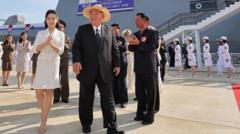In a significant move aimed at thawing strained ties with North Korea, South Korea's newly elected President Lee Jae-myung ordered the cessation of K-pop music and propaganda broadcasts that fueled animosity between the two nations.
South Korea's New President Halts K-Pop Propaganda Broadcasts to North Korea

South Korea's New President Halts K-Pop Propaganda Broadcasts to North Korea
In a bid to improve inter-Korean relations, President Lee Jae-myung puts an end to loudspeaker broadcasts that heightened tensions.
On June 11, 2025, South Korea took a notable step under President Lee Jae-myung's administration by turning off loudspeakers that had been blasting K-pop songs and disseminating news into North Korea for the past year. This action marks one of Lee's initial endeavors to mend relations with North Korea, a significant shift from the approach of his impeached predecessor, Yoon Suk Yeol.
Kang Yu-jung, a spokesperson for President Lee, emphasized that the halt in broadcasts is intended to "help restore trust in South-North Korean relations and build peace on the Korean Peninsula." The inter-Korean relationship had deteriorated sharply during Yoon's presidency, characterized by escalating tensions and provocative actions from both sides.
Under Yoon's administration, support for disseminating information into North Korea was reinstated. Activists, many of whom were North Korean defectors, released large balloons carrying propaganda leaflets criticizing the North's leader, Kim Jong-un, labeling him a "bloodthirsty dictator" and worse. In retaliation, North Korea sent balloons filled with trash into South Korea, exacerbating the situation.
To counter North’s aggressive stance, Yoon's government reactivated its propaganda loudspeakers last year, targeting North Korean soldiers and villagers with K-pop tunes and news updates. The increased volume of broadcasts distressed South Korean villagers, prompting many to invest in soundproofing measures.
With the turn-off of the loudspeakers, President Lee’s government sent a signal to North Korea, essentially proposing a cease-fire in the ongoing "loudspeaker war." Furthermore, South Korean military officials announced they would be monitoring the situation closely to see if North Korea reciprocates this gesture by silencing its own broadcasts.






















